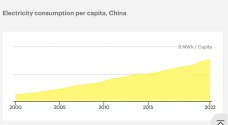US Nominal GDP is priced in USD - for you to claim US GDP is 'fake' is functionally labelling the USD as overvalued. This is not a strawman at all.
PRODUCT is priced in USD. That product could also be shit and overvalued due to internal predatory monopoly rent-seeking, supply constraint paired with excessive currency printing, including financial, litigation, etc voided transactions that are not productive but fictional, etc.
We are not yet at the stage of
exchange rates. But I agree, they could also contribute to that exaggeration. For example, currently, relatively higher interest rates in the US contribute to this artificial rise in nominal GDP that diverges it from the real-world results even further...
By your logic, Goldman Sachs and Lockheed Martin are...absolutely not part of the US economy.
They are a part of the US economy, the isolated part. You should have said precisely which part of the economy is responsible.
Endless litigation and administrative friction, or retail sales, for example, have no connection to the USD's international dominance.
How does the USD have the backing of the US military when you apparently believe the US military has no technical edge?
What I meant is that what is currently responsible for the USD's continued dominance internationally is mainly
the network effect first.
However, initially, what caused the USD to be used to such an extent, enough for it to kickstart the network effect, was probably military dominance of some sort.
How much it plays a role today, I don't know, in the past they could've used the military to prevent de-dollarization in some isolated cases like Lybia for example.
But since the Ukraine War started basically everyone started de-dollarizing, without any repercussions, it became too much for the US military to handle I think.
However, there are many more factors that contributed to that initial USD hegemony, the military was just one of the examples I gave you.


